Accompanied by the 32-gun warship USS Cyane, the Elizabeth sailed out of New York Harbor on 6 February 1820 on a pioneering voyage with an unusual passenger list: 88 free African American emigrants supervised by three white agents from the American Colonization Society (ACS). Their destination: the coast of Africa, where the ACS hoped to found a colony to pursue its goal of deporting all of America’s black freedmen. The ACS colony became the independent nation of Liberia in 1847.
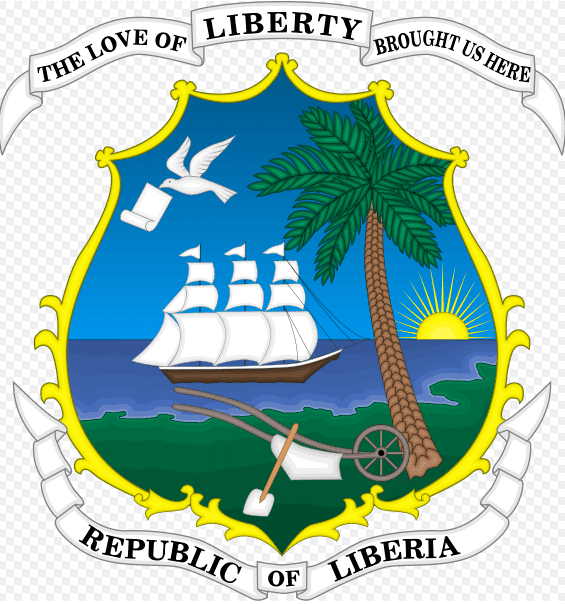
Few Americans know about the American Colonization Society, even though it formed in 1816 and did not officially dissolve until 1964. Right from its beginning, the ACS was a curious mix of racism and benevolence, a society of abolitionists and slave owners who agreed on only one thing: it was better to take blacks from America and return them to Africa.
Many ACS members were Quakers and almost all opposed slavery and abhorred the slave trade. They genuinely believed blacks would never be integrated into mainstream white America and could better find happiness and prosperity in Africa. While they primarily brought free blacks to Africa, they also paid slave owners to liberate slaves and gave them passage to Africa as well. Other ACS members were slave owners who feared the presence of free blacks would encourage slave revolts, and worried their example would encourage runaways.
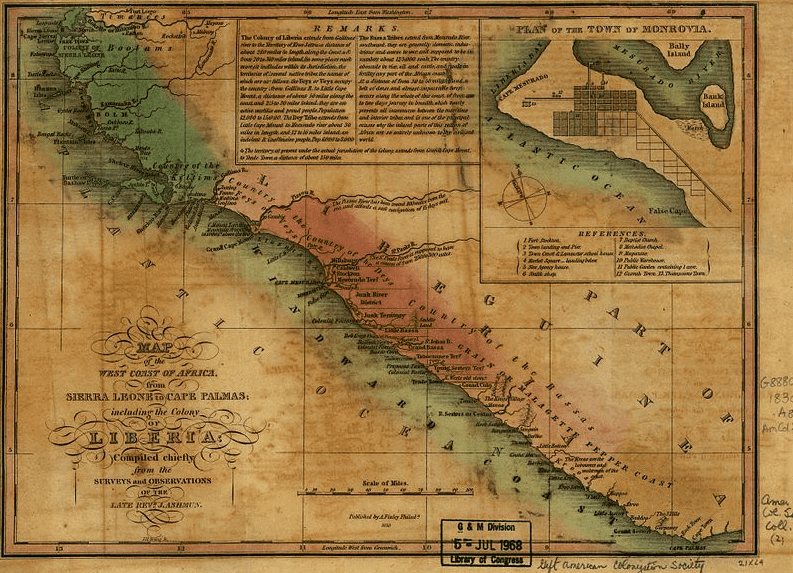
Membership in the ACS was a veritable who’s who of leading American men in the first half of the nineteenth century: Henry Clay, Stephen Douglas, Fernando Fairfax, Francis Scott Key, James Madison, John Marshall, James Monroe, John Randolph, General Winfield Scott, William Seward, Roger Taney, William Thornton, Bushrod Washington (George Washington’s nephew), and Daniel Webster.
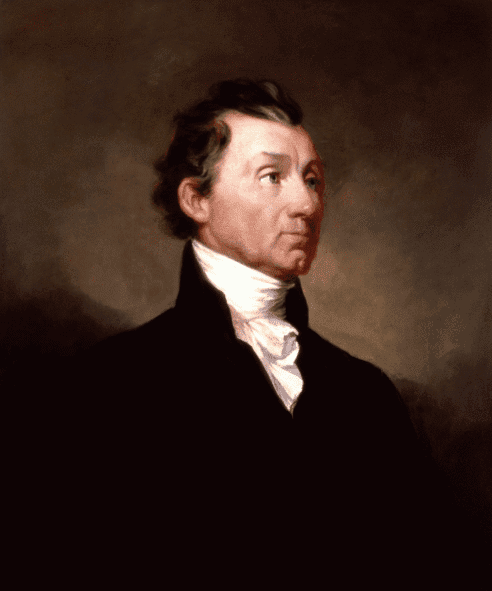
Ex-president Thomas Jefferson publicly supported the Society – he had long been an advocate of colonization of free blacks. President James Madison arranged for public funding when the Society formed, and when the Elizabeth sailed in 1820 the Cyane provided protection under the direct order of President James Monroe. In fact, President Monroe was so supportive of the Society in general that Liberia’s capital Monrovia was named in his honor.
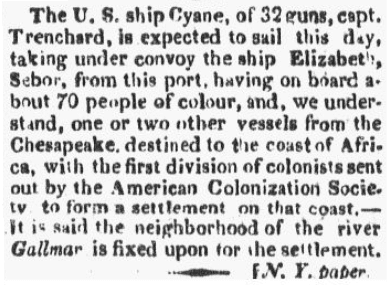
Here is a transcription of this article:
The U.S. ship Cyane, of 32 guns, capt. Trenchard, is expected to sail this day, taking under convoy the ship Elizabeth, [capt.] Sebor, from this port, having on board about 70 people of colour, and, we understand, one or two other vessels from the Chesapeake, destined to the coast of Africa, with the first division of colonists sent out by the Americana Colonization Society to form a settlement on that coast. – It is said the neighborhood of the river Gallmar is fixed upon for the settlement.
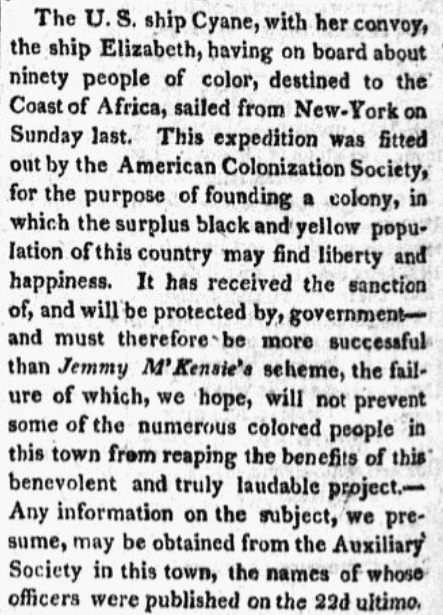
Here is a transcription of this article:
The U.S. ship Cyane, with her convoy, the ship Elizabeth, having on board about ninety people of color, destined to the Coast of Africa, sailed from New-York on Sunday last. This expedition was fitted out by the American Colonization Society, for the purpose of founding a colony, in which the surplus black and yellow population of this country may find liberty and happiness. It has received the sanction of, and will be protected by, government – and must therefore be more successful than Jemmy M’Kensie’s scheme, the failure of which, we hope, will not prevent some of the numerous colored people in this town from reaping the benefits of this benevolent and truly laudable project. – Any information on the subject, we presume, may be obtained from the Auxiliary Society in this town, the names of whose officers were published on the 22d ultimo.
Note: In 1820 many sagacious observers worried that the divisive issue of slavery had the potential to tear the nation apart, and seized upon the ACS scheme as a possible way to avert this great calamity – such as the following newspaper article.
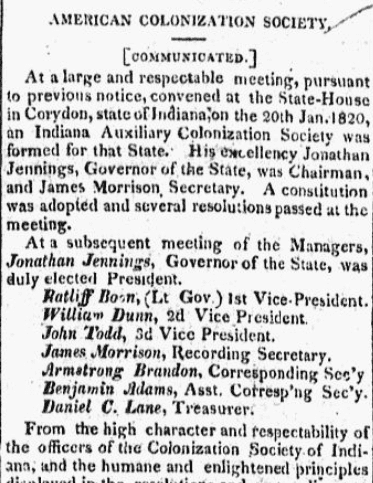
Here is a transcription of this article:
American Colonization Society
At a large and respectable meeting, pursuant to previous notice, convened at the State-House in Corydon, state of Indiana, on the 20th Jan. 1820, an Indiana Auxiliary Colonization Society was formed for that State… From the high character and respectability of the officers of the Colonization Society of Indiana, and the humane and enlightened principles displayed in the resolutions and proceedings at the meeting at the formation of the Society, the friends of the American Colonization Society may confidently look for the most efficient aid in support of their cause. We hail with great satisfaction this evidence of decided approbation by our western brethren. At this period of excitement and agitation, on other questions, respecting the colored population in our country, it is consoling and encouraging to present one to the public, in which the humane and intelligent from every part of the United States may unite; and which may tend to heal the divisions which have been excited.
Note: The unsettling mixture of racism and benevolence motivating the American Colonization Society can be seen in the following memorial, which the Society presented to Congress on 1 February 1820, five days before the Elizabeth’s departure, in the hopes of securing federal funding.
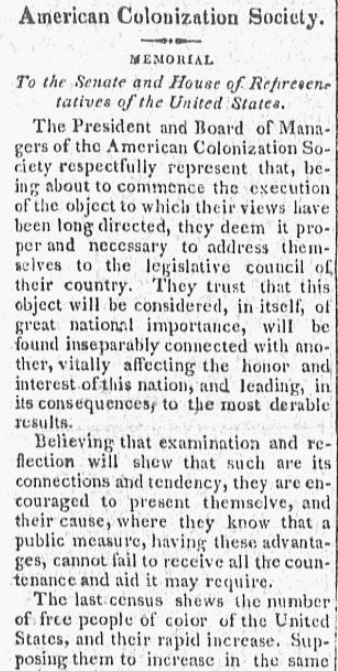
Here is a transcription of this article:
American Colonization Society
Memorial
To the Senate and House of Representatives of the United States.
The President and Board of Managers of the American Colonization Society respectfully represent that, being about to commence the execution of the object to which their views have been long directed, they deem it proper and necessary to address themselves to the legislative council of their country. They trust that this object will be considered, in itself, of great national importance, will be found inseparably connected with another, vitally affecting the honor and interest of this nation, and leading, in its consequences, to the most desirable results.
…The last census shews the number of free people of color of the United States, and their rapid increase. Supposing them to increase in the same ratio, it will appear how large a proportion of our population will, in the course of even a few years, consist of persons of that description.
No argument is necessary to shew that this is very far indeed from constituting an increase of our physical strength; nor can there be a population, in any country, neutral as to its effects upon society. The least observation shews that this description of persons are not, and cannot be, either useful or happy among us; and many considerations, which need not be mentioned, prove, beyond dispute, that it is best, for all the parties interested, that there should be a separation; that those who are now free, and those who may become so hereafter, should be provided with the means of attaining to a state of respectability and happiness, which it is certain, they have never yet reached, and, therefore, can never be likely to reach, in this country.
…From the best information your memorialists have been able to obtain, of the nature, causes, and course of this [slave] trade, and of the present situation of the coast of Africa, and of the habits and dispositions of the natives, they are well assured that the suppression of the African slave trade, and the civilization of the natives, are measures of indispensable connection.
…Since the establishment of the English settlement at Sierra Leone, the slave trade has been rapidly ceasing upon that part of the coast.
Not only the kingdoms in its immediate neighborhood, but those upon the Sherbro and Bagroo rivers, and others with whom the people of that settlement had opened a communication, have been prevailed upon to abandon it, and are turning their attention to the ordinary and innocent pursuits of civilized nations.
That the same consequences will result from similar settlements cannot be doubted. When the natives there see that the European commodities, for which they have been accustomed to exchange their fellow-beings, until vast and fertile regions have become almost depopulated, can be more easily and safely obtained by other pursuits, cannot it be believed that they will hesitate to profit by the experience?
…That such points of settlement would diffuse their light around the coast, and gradually dispel the darkness which has so long enshrouded that continent, would be a reasonable hope, and would justify the attempt, even if experience had not ascertained its success. Although, therefore, much may be effected by the vigilant operations of a well disposed naval force, it is to be feared that much will always remain to be done, until some degree of civilization is attained by the inhabitants of the coast of Africa. The present measures, therefore, for the suppression of the slave trade, if unconnected with others for the improvement of the natives, must be long continued, and the effects produced by them will be partial, tedious, and uncertain; and the least relaxation of this vigilance will revive it.
But those measures, and all other involving expense and labor, may be withdrawn, as soon as these establishments upon the coast become strong enough to participate in the contest against avarice and inhumanity, and shall obtain, from their evident advantages over the natives, a proper influence among them… your memorialists humbly consider, that the colonization of Africa offers the most powerful and indispensable auxiliary to the means adopted, for the extermination of a trade, which is now exciting, in every country, that just indignation, which has been long since felt and expressed in this.
…When, therefore, the object of the Colonization Society is viewed, in connection with that entire suppression of the slave trade, which your memorialists trust it is resolved shall be effected, its importance becomes obvious and extreme.
…Your memorialists beg leave to state, that, having expended considerable funds in prosecuting their enquiries and making preparations, they are now about to send out a colony, and complete the purchase, already stipulated for with the native kings and chiefs of Sherbro, of a suitable territory for their establishment. The number they are now enabled to transport and provide for, is but a small proportion of the people of color who have expressed their desire to go. And without a larger and more sudden increase of their funds than can be expected from the voluntary contributions of individuals, their progress must be slow and uncertain. They have always flattered themselves with the hope, that when it was seen they had surmounted the difficulties of preparation, and shewn that means applied to the execution of their design, would lead directly and evidently to its accomplishment, they would be enabled to obtain for it the national countenance and assistance. To this point they have arrived; and they therefore respectfully request, that this interesting subject may receive the consideration of your honorable body, and that the Executive Department may be authorized, in such way as may meet your approbation, to extend to this object such pecuniary and other aid, as it may be thought to require and deserve.
Your memorialists further request, that the subscribers to the American Colonization Society may be incorporated, by an act of Congress, to enable them to act with more efficiency, in carrying on the great and important objects of the Society, and to enable them, with more economy, to manage the benevolent contributions entrusted to their care.
— John Mason, W. Jones, E. B. Caldwell, F. S. Key, Comm’rs.
Washington, Feb. 1, 1820.
Note: An online collection of newspapers, such as GenealogyBank’s Historical Newspaper Archives, is not only a great way to learn about the lives of your ancestors – the old newspaper articles also help you understand American history and the times your ancestors lived in, and the news they talked about and read in their local papers. Were any of your ancestors involved with the American Colonization Society or Liberia? Please share your stories with us in the comments section.
Related Articles:
